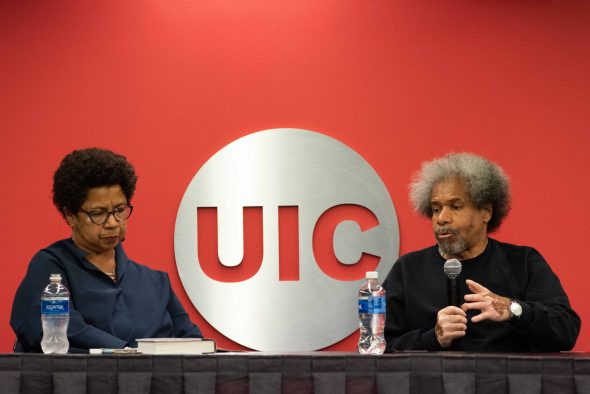‘Angola 3’ prisoner discusses life in solitary confinement during UIC presentation

For more than four decades, Albert Woodfox lived in a 6-foot-by-9-foot prison cell for 23 hours a day, made even smaller when factoring in the toilet bowl, sink, bed and table that took up any available space.
As one of the “Angola 3,” the political prisoner and activist spent more than 44 years behind bars in solitary confinement, the longest time served by any prisoner in the history of the United States.
Woodfox, who was released from prison in 2016, was at the University of Illinois at Chicago Sept. 24 to discuss his memoir, “Solitary,” during a two-hour conversation sponsored by UIC’s Social Justice Initiative and attended by more than 200 people. The book has been long-listed as a contender for this year’s National Book Award for Nonfiction.
During the discussion led by Social Justice Initiative director Barbara Ransby, Woodfox discussed his life as a young African-American boy growing up in Louisiana, where he was guided by his mother’s street smarts and natural wisdom that he would later discover echoed in the principals of great thinkers such as Confucius and Nelson Mandela.
He said that through the racism that was being supported and encouraged by the white police in the black community, he learned early on from his mother and the neighborhood to fear the police, who seemed to be an occupied force. He recalled one of his early memories as a child as he waited with his mother for a bus when a police car appeared.
“I remember the closer the police came, my mom was pushing me, so by the time they got right in front, she had pushed me behind her so she was shielding me from the threat,” Woodfox said.
Arrested and convicted at a young age for an armed robbery, Woodfox initially was sentenced to 50 years in prison in the Louisiana State Penitentiary in Angola before being given a life sentence in solitary for the murder of a prison guard on trumped-up charges and false witness testimony.
But for Woodfox and the other men — Robert King and Herman Wallace, alongside whom he served decades in solitary and made up the “Angola 3” — their real crimes were being members of the Black Panther Party and working as human rights advocates behind bars.
He credited the Black Panther Party for helping the black community at a time when the community was struggling and fighting for civil rights. He credited the party with helping to educate him to support and “love” the community and helped start a chapter in prison.
Ransby, who is a professor of African American Studies, Gender and Women’s Studies, and a historian, writer and longtime community activist, said a point overlooked when discussing the party was the assistance and good it did to support the black community and fight for change.
“It’s been so long, over 50 years, now the true meaning and definition of whatever it was to be a Black Panther is coming out,” Woodfox said.
Woodfox and the others served as mentors to fellow inmates, teaching many to read and prepare themselves for life outside prison. Woodfox and the others served as elders who were involved in campaigns to stop prison sexual assaults and constant strip searches by guards, and they fought to restore the dignity that the penal system and racist views by guards and the warden tried to strip away from the men in detention.
He pointed to his role with other members of the Black Panthers to protect the young men who would be imprisoned by forming “Anti-Rape Squads.” He told Ransby and the audience that the constant supply of young inmates could be as young as 16-years-old. Once inside they were targeted by sexual offenders who would assault them and use them as sex slaves.
He and the other Black Panthers decided to take a stand against this abuse.
“I remember watching this kid and the saddest thing was to see another human being whose spirit had been broken,” he said. “I was both pained and outraged at the same time that someone could do this to another human being. This was my awakening to humanity, that was me starting to realize the wonderful value of being a human being.”
He said that among the most difficult adjustments he had to make when he was released from Angola, a maximum-security prison and former slave plantation in Louisiana, was getting used to people around him.
Since his release, he has traveled around the world and has had to get used to being in public again, sometimes in situations where he is surrounded by hundreds of people.
“You only had a really small area to move around in and so my biggest surprise was having people move around me, someone would come up behind me and it would scare the (expletive) out of me,” said Woodfox.
After his release one of the first things he wanted to do was to visit his mother’s grave, as she had died while he was behind bars. He said after discovering books and educating himself over the years, he looks back at his single mother for inspiration and said social struggle, for him, is “a life-time commitment.”
“My mom was my first hero; it took me 27 years to realize that,” he said. “I always thought these great men and women that I read about had made the biggest impact, but I’d come to realize that the wisdom and strength my mom exhibited had finally come to me.”
Woodfox’s discussion kicked off SJI’s theme, “Home,” for the 2019-2020 school year. The group will tackle topics such as, “What does it mean when a prison cell is supposed to substitute for a home?” This topic is especially important as 2 million people in the United States, including migrant families, are currently in detention. For more information about SJI, click here.
